13 Types of Companion Plants for Brussels Sprouts (With Pictures)
-
Jeff Weishaupt
- Last updated:
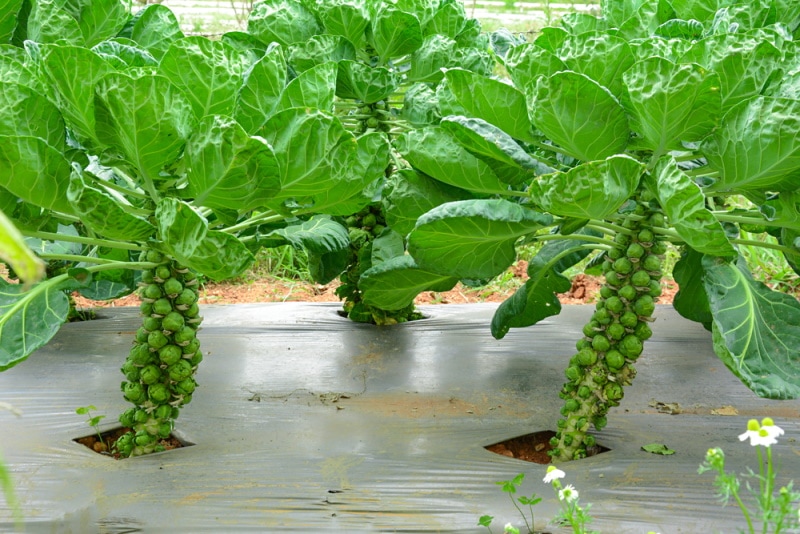
Companion planting is a gardening technique that attracts beneficial insects and repels pests. It also improves soil nutrients, provides ground cover, and encourages faster growth.
The process involves planting two or more plants together. This helps achieve the first plant’s benefits while enhancing the other’s flavor. Unfortunately, Brussels sprouts fall prey to various pests, such as cabbage worms, Japanese beetles, and aphids.
With the help of certain companion plants, you can repel such pests and benefit from more flavorful Brussels sprouts. Here are the 13 best companion plants for Brussels sprouts and the eight worst.
The 13 Types of Companion Plants for Brussels Sprouts
1. Carrots
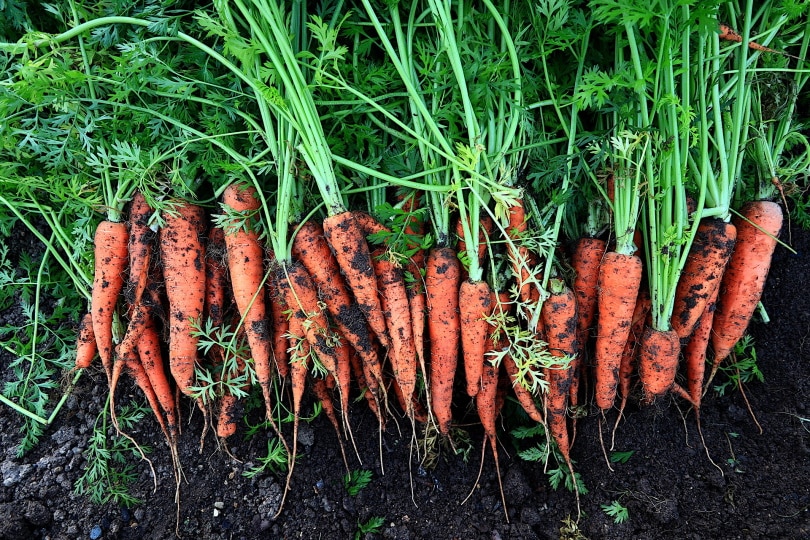
Carrots are mainly beneficial for Brussels sprouts as they enhance the flavor of the vegetable. In addition, these hearty vegetables are loaded with vitamin A and beta-carotene, lowering the risk of diabetes. More importantly, they work perfectly with Brussels sprouts.
The best part about carrots is that they’re easy to grow and take up limited space in your garden. That means you can grow them close to Brussels sprouts, which are also low-maintenance vegetables.
2. Celery
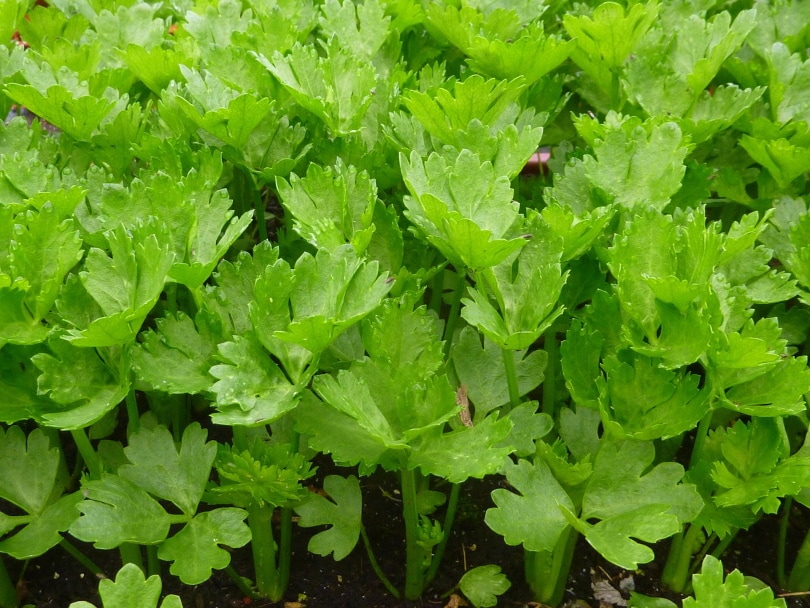
As we mentioned, Brussels sprouts naturally attract bugs and pests like aphids, cabbage worms, cutworms, and Japanese beetles. Luckily, celery is a highly beneficial companion plant for Brussels sprouts as it repels pests and bugs like white cabbage moths.
A study1 indicates that celery has better properties than synthetic mosquito repellants. Companion planting it with Brussels sprouts isn’t just beneficial for the latter vegetable; it benefits celery, too.
On the one hand, celery repels pests and protects the sprouts. Meanwhile, the sprouts provide shade for the crisp marshland vegetable as it requires little sunlight to grow.
3. Peas
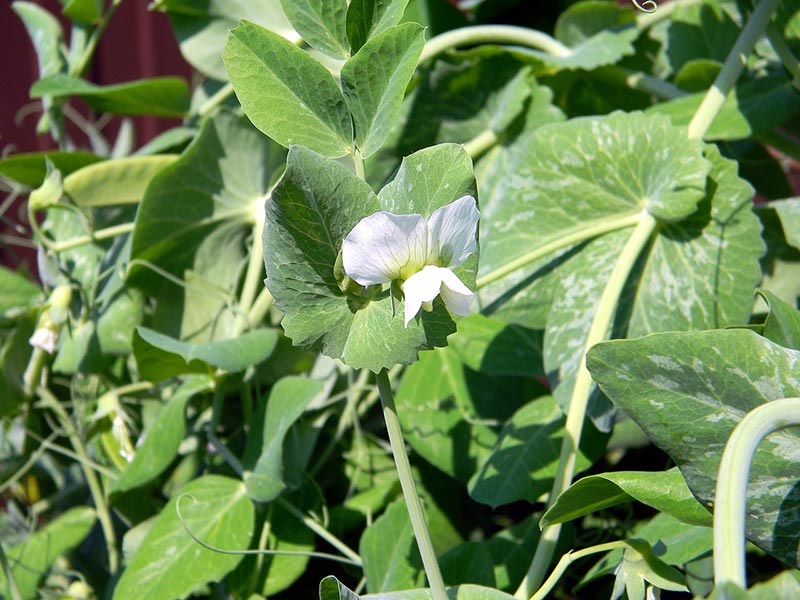
Peas are excellent companion plants for Brussels sprouts. But they also aid other Brassica family members, such as cauliflower, broccoli, and cabbage. They aid Brussels sprouts by loosening the soil, which can be beneficial in more ways than one.
Since pea plants produce long root systems, they inevitably loosen the soil as they reach for moisture. This is helpful for Brussels sprouts as it allows their roots to breathe. In addition, the nodules of peas store any excess nitrogen.
When their roots decay, peas release their excess nitrogen into the soil. As a result, Brussels sprouts can benefit from a much-needed nitrogen source.
4. Onions
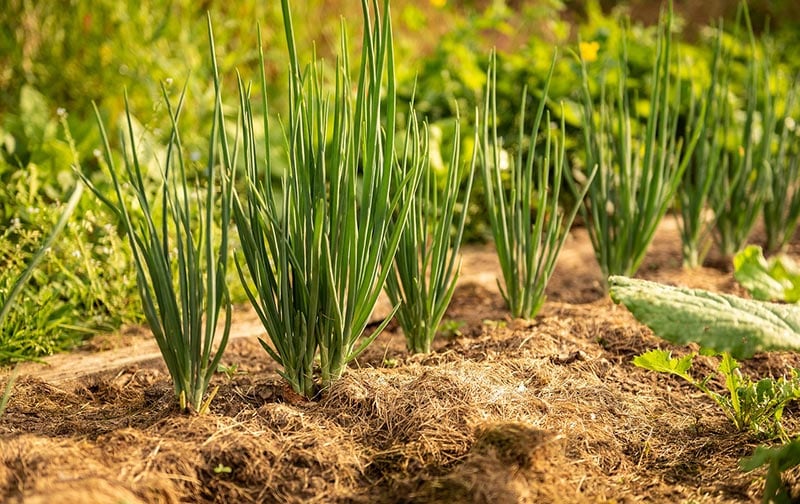
Rust flies are naturally attracted to Brussels sprouts. Once they lay eggs in the plant, they can kill your Brussels sprouts. They may even transfer diseases like bacterial soft rot, black rot, clubroot, damping off, downy mildew, or powdery mildew.
Luckily, onions are the perfect companion plant to repel rust flies. These anti-inflammatory vegetables have a high sulfur content, producing a smell that bugs hate. As a result, they keep away harmful pests and bugs like rust flies, protecting your Brussels sprouts.
5. Mint
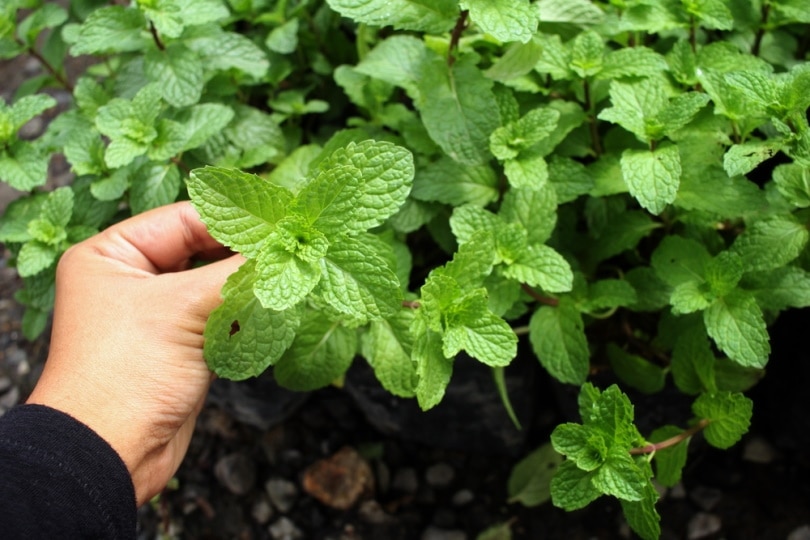
It’s no secret that Brussels sprouts attract harmful pests like flea beetles and aphids. Aphids leave an unsightly, sticky honeydew and clusters on your plants. They also transmit plant viruses, which can weaken sensitive seedlings and cause leaf stunting.
On the other hand, flea beetles harm your Brussels sprouts by feeding on the leaves and stem, leaving irregular holes in the plant. Companion planting mint with Brussels sprouts can protect your plant by repelling these bugs.
The menthol in mint has biocidal properties. These properties repel and control mites, mosquitoes, and other pests.
6. Basil
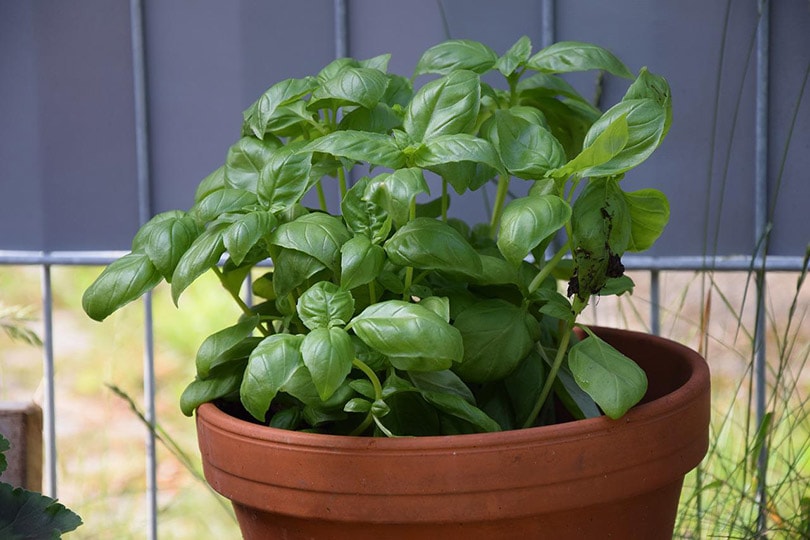
Basil helps your Brussels sprouts in a way similar to mint: by repelling flies, mites, mosquitos, and aphids. It does so with the help of four volatile compounds: citronella, estragole, limonene, and nerolidol.
These volatile compounds interrupt the mosquito’s heat and carbon dioxide sensors. As a result, they cannot recognize one of their favorite meals: your healthy Brussels sprouts. Basil also confuses and irritates the mosquito’s senses.
This causes them to leave the area in order to recover their senses. So, there’s no doubt that basil is the perfect addition to your next Italian meal while keeping annoying mosquitos out of your garden.
7. Rosemary
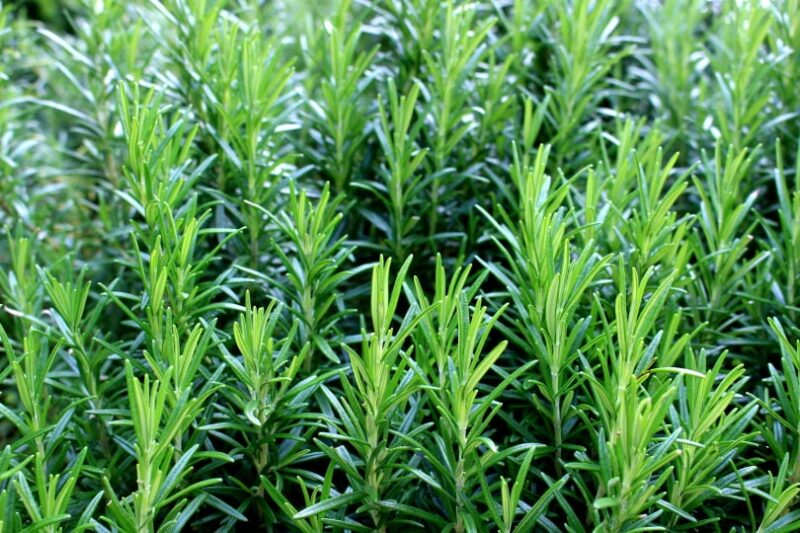
We already know how rust flies can harm your Brussels sprouts, but moths are a way worse threat. They chew off seedlings, young transplants, and garden vegetables in the early stages. As a result, they prevent your Brussels sprouts from growing at all.
Luckily, rosemary is the perfect companion plant for keeping moths and rust flies away. Like mint, it drives bugs away with its pungent scent, especially cabbage moths. Since rosemary thrives in containers in hot, dry weather, you can place it in various spots in your garden.
8. Beans
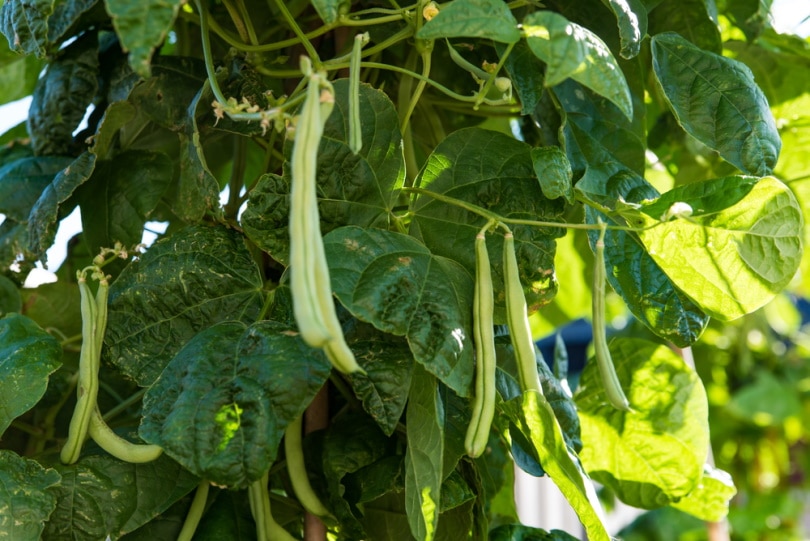
Brussels sprouts thrive on a nitrogen-rich diet, which is why soybeans are an ideal companion plant for them. Soybeans and other similar legumes fix the nitrogen in the soil. They do so by developing a symbiotic relationship with soil-dwelling bacteria.
The soil-dwelling bacteria extract nitrogen from the air in the soil before feeding it to the Brussels sprouts and the soybeans. In return, soybeans supply the necessary carbohydrates to the bacteria.
As a result, these legumes can convert atmospheric nitrogen (N2) into ammonium nitrogen (NH4). Overall, it’s highly beneficial to your Brussels sprouts.
9. Marigold
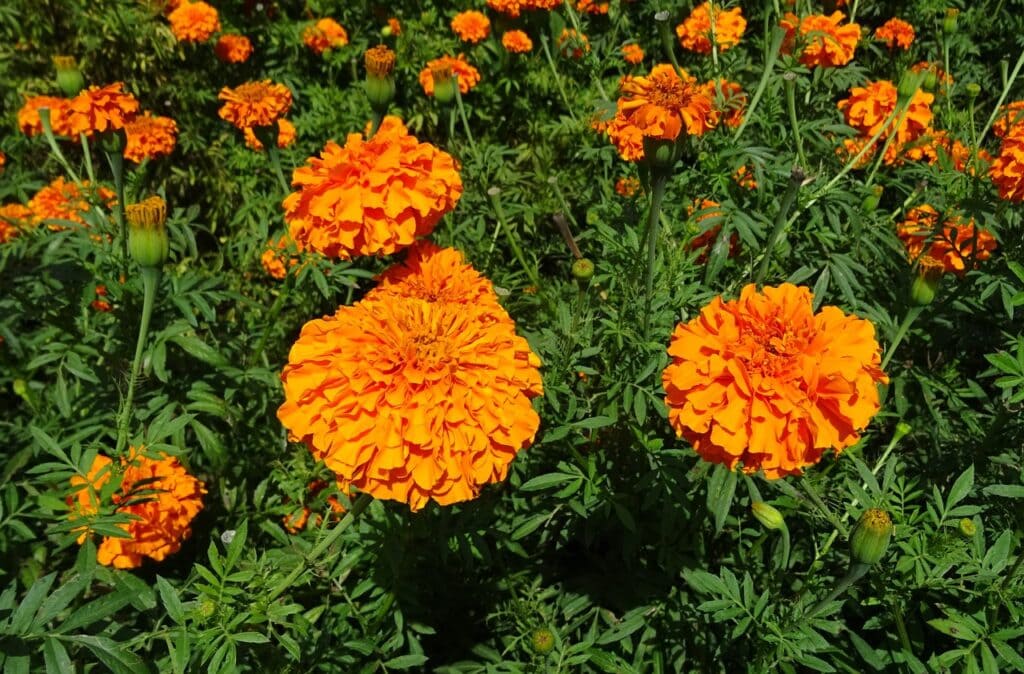
Nematodes are plant parasites that feed on the roots of plants. As a result, they damage the plant’s root system and reduce its ability to absorb water and nutrients. Since Brussels sprouts thrive on nutrients, these parasites can be especially harmful.
In addition, whiteflies harm Brussels sprouts by sucking out their juices to weaken their stem and stunt their growth. Luckily, marigold plants repel both these parasites, which is why you should plant them near your Brussels sprouts.
By secreting alpha-terthienyl from their roots, they can inhibit the development of nematode eggs. As a result, root-knot nematodes and whiteflies can’t build up in the soil.
10. Chamomile
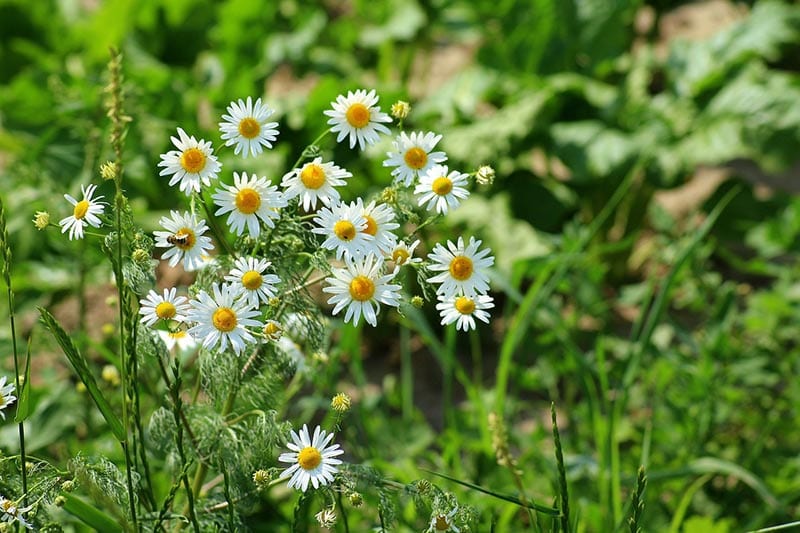
Like cabbage moths, cabbage loopers attack and damage your Brussels sprouts. In addition, they ultimately ruin their taste. So, if you’re hoping for more flavorful sprouts this harvest, put a chamomile plant near them.
Chamomile produces a naturally occurring compound called azulene. This compound improves the natural flavor of brassicas, including cabbages, sprouts, and cauliflowers. It also covers up the sulfur-like scent of Brussels sprouts with its strong, fresh apple scent.
This keeps potential predators like cabbage loopers away from your sprouts.
11. Dill
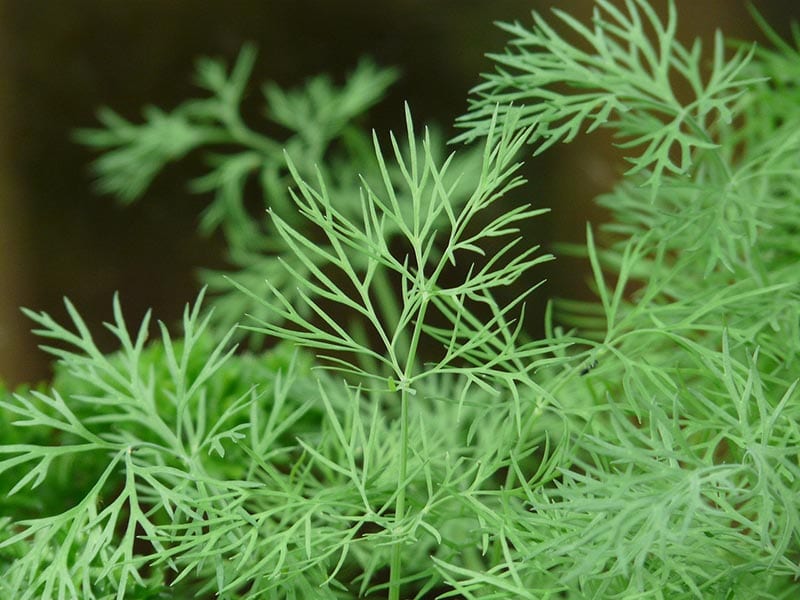
By attracting bees to your garden, dill encourages pollination for your Brussels sprouts. We recommend quick-blooming dill varieties if you want to attract more bees. Contrary to popular belief, Brussels sprouts do need pollination.
Once your dill plant is mature, it will grow showy clusters of yellow flowers, inevitably buzzing with large and small pollinators. If you want your Brussels sprouts to produce seeds, you must add dill to your garden.
12. Garlic
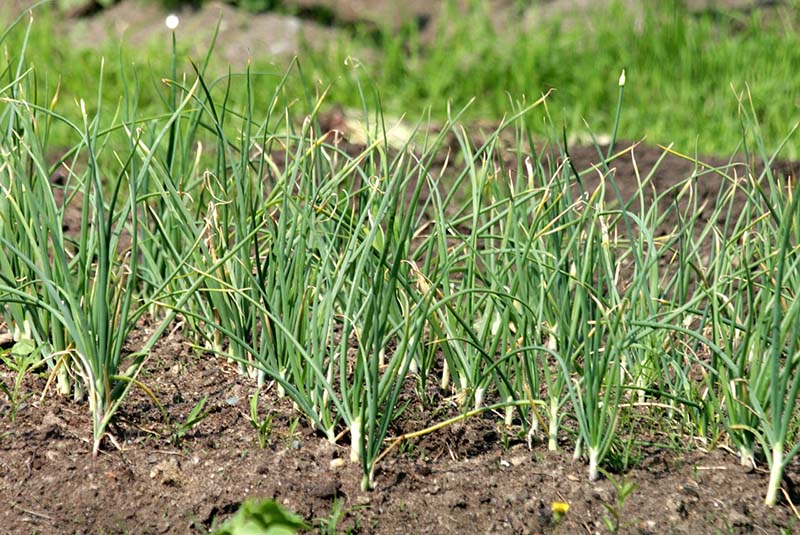
As we mentioned, aphids, larvae, and whiteflies are incredibly harmful to the growth of your Brussels sprouts. Garlic is a great way to repel such pests as it contains antifungal properties, working as a natural insect repellent within the soil.
The sulfur present in garlic also leaves a lingering odor that deters mosquitos by confusing and irritating them. Aside from repelling pests and bugs, garlic is also very easy to grow and enhances the flavor of your Brussels sprouts.
13. Sage
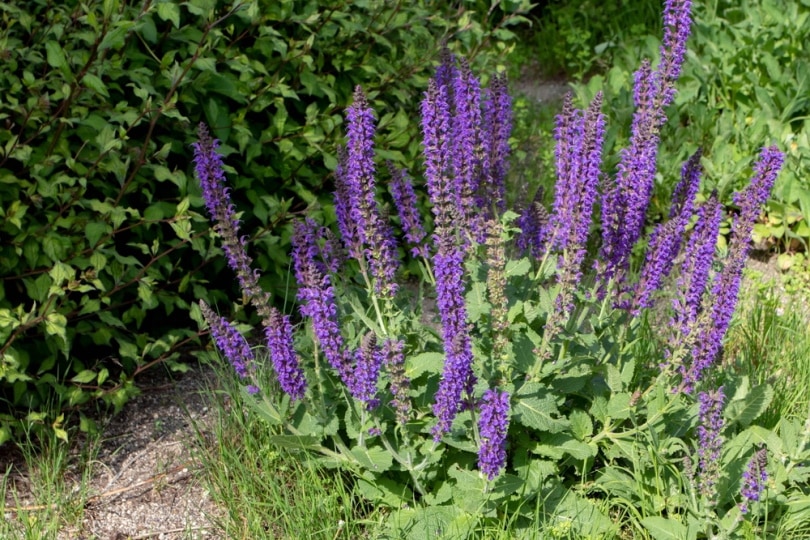
Finally, sage is one of the most efficient companion plants for Brussels sprouts as it keeps moths and rust flies away. Growing sage is easy, but you can burn it in your garden to eliminate mosquitos and insects more quickly.
Worst Companion Plants for Brussels Sprouts
Only some plants can work as good companions for this thousand-headed cabbage. Plants like tomatoes, eggplants, and peppers can negatively affect Brussels sprouts. They do so by absorbing their nutrients or attracting pests.
Peppers are a terrible companion plant for Brussels sprouts as they take sunlight away from your cabbage-like plant. In fact, they require a minimum of eight hours of direct sunlight daily. Eggplants are also unsuitable as they compete with Brussels sprouts for the required nutrients.
You’ll face a similar issue with tomatoes, as they take away precious nutrients from the soil. On the other hand, potatoes and mustard greens attract bugs that are harmful to Brussels sprouts. That includes potato bugs, Jerusalem crickets, and minuscule wasps.
Strawberries are also an unsuitable companion plant for Brussels sprouts. They attract slugs, which inevitably stunts their growth. We would also not recommend growing Brussels sprouts with tomatoes, as they can inhibit tomato growth.
Lastly, other cabbage family members should not be planted near Brussels sprouts, as they attract the same pests you’re trying to deter. That includes cauliflower or broccoli.
Conclusion
Brussels sprouts are relatively easy to grow and don’t take up space in your garden. There’s no reason not to grow these nutrient-rich vegetables. But unfortunately, these nutrients are taken away by pests like cabbage worms, Japanese beetles, cutworms, and aphids.
Luckily, companion plants like celery, onions, and marigolds get rid of such pests and improve the flavor of your Brussels sprouts. However, avoid planting this vegetable with eggplants, mustard greens, or potatoes. In a worst-case scenario, they can absorb its nutrients or attract pests.
Featured Image Credit: Atstock Productions, Shutterstock
Contents

